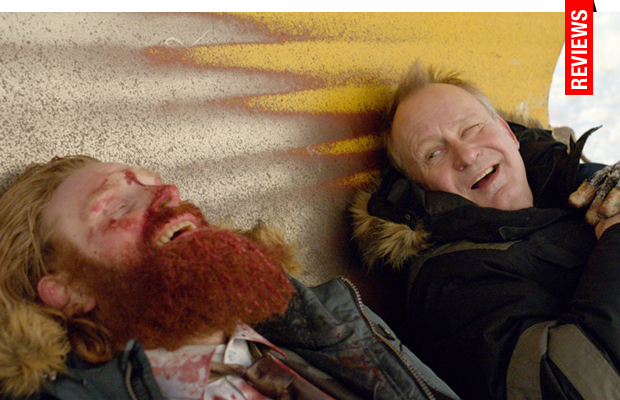Gone Baby Gone: Moland’s Deadpan Nordic Noir Enhanced by Skarsgard
Snow plow driver Nils (Skarsgard) finds his life suddenly upended when his son dies, apparently the victim of a self-inflicted drug overdose. While his wife accepts the prognosis, causing the dissolution of their marriage, Nils is certain his son was a victim of foul play, leading him to his kid’s best friend, the ne’er-do-well Finn (Tobias Santelmann). Nils quickly discovers his intuition was correct, and begins mowing down the low hanging fruit in the legion of criminals reporting to the recently minted criminal ringleader The Count (Pal Sverre Hagen). When bodies begin to mount, The Count is certain his peaceable splitting of territory with the Serbians, controlled by Papa (Bruno Ganz), has somehow ruptured. But questions start being asked, leading them to ascertain Nils’ identity thanks to his estranged brother (Peter Andersson), who used to work for The Count’s father.
What’s taken so long for the title to reach a theatrical release stateside is anyone’s guess, especially considering Moland is adapting the film’s English language remake (set to star America’s favorite harbinger of familial motivated vengeance, Liam Neeson) and his entry in the Department Q trilogy, A Conspiracy of Faith has already premiered. Considering its somewhat nominal and straightforward narrative, In Order of Disappearance could have benefited greatly from a more efficient running time, because by the time we get through all twenty-two deaths, each heralded by a black screen featuring the character’s nickname as well as a religious symbol denoting both faith and ethnic background, the macabre flourishes become monotonous and gimmicky. What’s left to goad appreciation is basically a deadpan, world-weary performance from Stellan Skarsgard in blue collar mode as a man with nothing left to lose. Had we focused more tightly on his silent, even morose reserve, and trimmed away some of the villainous vacuity, this would have seem more akin to those lean, mean narratives starring Charles Bronson, when directors like Michael Winner, J. Lee Thompson, and Sam Peckinpah knew how to flesh out a storyline pockmarked by ceaseless, vengeful savagery.
Instead, beyond the welcome presence of Bruno Ganz as the grizzled and raspy Papa, In Order of Disappearance runs aground with an odd mixture of contemporary and archaic character tics amongst the younger supporting characters. If Hagen’s stylishly hirsute Count inspires meager laughter with his bitchy caricature during asides relating to veganism and his surly Danish ex-wife (“He hasn’t eaten additives in this house!” she counters when accused of bad parenting), his secretly gay henchmen (including Jacob Oftebro), who are continually pawing at one another whenever alone together, belong to a fine tradition of exploitation elements in genre—they’re clearly marked as perverts fated for a swift and brutal end thanks to karma’s far reaching resolve. If only Kim Fupz Aakeson’s (who wrote Moland’s last film starring Skarsgard, A Somewhat Gentle Man, as well as David Mackenzie’s wonderful Perfect Sense) screenplay didn’t go through the veritable motions. At one point, Skarsgard screams in anguish, “A father must avenge his son!” as explanation for his obsessive killing spree. But since we never get a sense of their relationship he could either be acting out of response of grief or guilt—either way, In Order of Disappearance doesn’t allow us to become invested in his motivation, unquestionably transcribed as merely a dish best served cold.
★★½/☆☆☆☆☆
